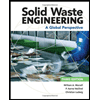
Concept explainers
Find the average density of the gas exiting the engine.
Answer to Problem 45P
The average density of the gas exiting the engine in kgm3, slugsm3, and lbmft3 are 0.155 kgm3, 3×10−4 slugsm3 and 0.0097 lbmft3 respectively.
Explanation of Solution
Given data:
Consider that the inlet area of the engine as 5 ft2.
Ain=5 ft2 (1)
Consider that the outlet area of the engine as 4 ft2.
Aout=4 ft2 (2)
Formula used:
Consider the following expression.
(air mass flow rate)in+(fuel mass flow rate)in=(combustion mass flow rate)out
In this problem, the fuel mass flow rate is neglected since it is negligible value when compared air mass flow rate.
Consider that the mass flow rate of air enters is equal to the mass flow rate of exists.
(mass flow rate)in=(mass flow rate)out (3)
Write the expression for the mass flow rate.
mass flow rate=(density)(volume flow rate) (4)
Calculation:
Convert the unit of the value in equation (1) from ft2 to m2.
Ain=5×(1(3.28084)2) m2 [∴1 m =3.28084 ft]=0.464 m2
Convert the unit of the value in equation (2) from ft2 to m2.
Aout=4×(1(3.28084)2) m2 [∴1 m =3.28084 ft]=0.372 m2
Substitute equation (4) in (3),
[(density)(volume flow rate)]in=[(density)(volume flow rate)]outρin(volume flow rate)in=ρout(volume flow rate)out(ρin)(Vin)(Ain)=(ρout)(Vout)(Aout) [∴volume flow rate=(velocity)(area)]
Substitute 0.45 kgm3 for ρin, and 180 ms for Vin, 650 ms for Vout, 0.464 m2 for Ain, and 0.372 m2 for Aout,
(0.45 kgm3)(180 ms)(0.464 m2)=(ρout)(650 ms)(0.372 m2)
ρout=0.155 kgm3 (5)
Convert the unit of the value in equation (5) from kgm3 to slugsm3.
ρout=0.155 (114.5939) slugsm3 [∴1 slug=14.5939 kg]=3×10−4 slugsm3
Convert the unit of the value in equation (5) from kgm3 to lbmft3.
ρout=0.155 kgm3(2.20462 lbm1 kg)1 m3(3.28084)3 ft3 [∴1 kg=2.20462 lbm, and 1 m =3.28084 ft]=0.0097 lbmft3
Conclusion:
Thus, the average density of the gas exiting the engine in kgm3, slugsm3, and lbmft3 are 0.155 kgm3, 3×10−4 slugsm3 and 0.0097 lbmft3 respectively.
Want to see more full solutions like this?
Chapter 9 Solutions
ENGINEERING FUNDAMENTALS
- Need help. Find the answer to the boxes marked in red. Thanks!arrow_forwardFor the gravity dam shown in the figure, The following data are available: -Unit weight of concrete (Yconc) = 2.4 ton/m³ -Vertical upward earth quake factor (K,) = 0.1 -Neglect Wave pressure, silt pressure and ice force μ=0.65 a-Find heel and toe stresses (Pmin & Pmax) b-Is this structure safe against tension? c-Find the factor of safety against sliding and overturning (F.S, & F.Sover) 165 m 160 m t 10 m T I 4 m 50 100 marrow_forwardFor the gravity dam shown in the figure, The following data are available: -Unit weight of concrete (Yeone) 2.4 ton/m³ Vertical down ward earth quake factor (K,) = 0.1 Neglect Wave pressure, silt pressure and ice force The wind velocity (V)-45 Km/hr Straight length of water expanse (F) 75 Km =0.7 14-70m 3h T a- Find the factor of safety against sliding and overturning (F.Slid F.Sover) b- Find the toe and heel stresses (hma, and hmin.) c-Check tension. 8marrow_forward
- QUESTION 2-(40 Points) In the case where other information is given in the figure, the wall is under the effect of a uniform lateral wind load of 0.7 kN/m2. Since the foundation is sized according to the safe bearing capacity of the soil and the safe bearing capacity remains the same, find the width of this foundation asymmetrically (with uniform base pressure). Draw the vertical section of the wall of the asymmetric foundation and write its dimensions and values on it. Draw the T and M diagrams along the width. The foundation thickness is the same in both cases. q=0.7 kN/m2 5 m R Duvar Nd=Wd 0.7 m T K 0 0.6 0.5 1.7 m Yb-24 kN/m3 0.6 m T + foundationarrow_forwardCan you pls. Explain on how to get "BETA T" and "BETA C" on this study about VALUE OF TRAVEL TIME.arrow_forward440 CHAPTER 9 ANALYSIS OF STATICALLY INDETERMIN 9-23. Determine the reactions at the supports, then draw the moment diagrams for each member. Assume A and B are pins and the joint at C is fixed connected. EI is constant. Se 9-2 12 kN 2 m 2 m 6 kN/m A 6 m Prob. 9-23 Barrow_forward
- I need a solution to this problemarrow_forwardThree forces act on the ring. If the resultant force FR has a magnitude and direction as shown, determine the magnitude and the coordinate direction angles of force F3. == F2 = 110 N F3 F₁ = 80 N 3 X 45° FR = 120 N 30° yarrow_forwardFIND the CENTROID and the MOMENT OF INERTIA through the centroidal x axisarrow_forward
- (b) For the cantilever beam shown in Fig. 3, a roller support has been added at mid-span. Given that El is constant, use the force method to determine the following: (i) The reaction force at support C. (ii) The reaction forces at fixed support A. (15 marks) C 25 kN B 2 m 2 m Fig. 3: A propped cantilever beam [Q2=25 marks]arrow_forwardYou are working on a 1-km highway extension project that requires the construction of a 4-m tall soil embankment with a top width of 15-m and 2H:1V slopes. A borrow-pit (i.e., a place where soils are excavated, to then be placed elsewhere for construction projects) has been identified with e = 0.74, emax = 0.9, emin = 0.5. To avoid excessive road deformations, the soil will be compacted to a relative density of DR = 90% when placed in the embankment. Your boss estimates that extracting 100,000 m^3 of material from the borrow-pit should be enough for this project. Is your boss correct, or is more material than that needed? To decide, answer these questions: a) What volume of soil, as placed, is required to build the embankment? [Tip: draw the embankment] b) What is the void ratio of the material when placed in the embankment? c) What is the relative density of the material in the borrow-pit? d) When soil is extracted from the borrow-pit and then compacted it the embankment, how do…arrow_forwardThere are 20 cars traveling at constant speeds on a 1 mile long ring track and the cars can pass each other freely. On the track 25% of the cars are traveling at 20 mph, 50% of the cars are traveling 10 mph, and the remaining 25% of the cars are traveling at an unknown speed. It was known that the space mean speed of all the cars on the track is 20 mph. (a) What is the speed that the remaining 25% of cars are traveling at? (b) If an observer standing on the side of the track counted the number and measured the speed of all cars that passed her for one hour, what is the time-mean speed of all the cars the observer counted? (c) What is the flow rate measured by the observer? (d) What is the car density on the track? Does density times space mean speed equal flow rate?arrow_forward

 Engineering Fundamentals: An Introduction to Engi...Civil EngineeringISBN:9781305084766Author:Saeed MoaveniPublisher:Cengage Learning
Engineering Fundamentals: An Introduction to Engi...Civil EngineeringISBN:9781305084766Author:Saeed MoaveniPublisher:Cengage Learning Solid Waste EngineeringCivil EngineeringISBN:9781305635203Author:Worrell, William A.Publisher:Cengage Learning,
Solid Waste EngineeringCivil EngineeringISBN:9781305635203Author:Worrell, William A.Publisher:Cengage Learning,


